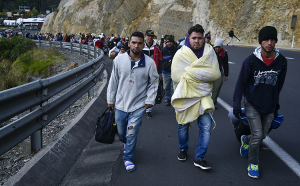|
Humanitarian Aid Denied Entry into Venezuela
February 11, 2019
The crisis in Venezuela is deepening, as more and more countries get involved in choosing sides between two political leaders who claim to be the country's leader. Meanwhile, many people are starving or fleeing the country and humanitarian aid sits unattended at the border. The South American country has been mired in a severe economic slump for quite awhile now, in part because of tight economic restrictions imposed by the U.S.; and refugees have fled the country in the tens of thousands. Shortages of food and medicine have resulted in widespread protests for many months. The president, Nicolas Maduro, was recently re-elected, in an election boycotted by opposition political parties. His government in recent years created a new super-body, the National Constituent Assembly, to trump the opposition-dominated National Assembly, the leader of which, Juan Guaido, recently declared himself president, invoking a gray area in the country's constitution. In recent days and weeks, more and more countries have publicly recognized Guaido as the rightful ruler of Venezuela. Among those countries so doing was the United States, with President Trump personally doing the recognizing. The U.S. sent a large shipment of humanitarian aid–food and medical supplies, complete with doctors to administer the medical supplies, but Maduro has set up military cordons to block the aid's entry into the country, saying that he believes the aid to be a sham and the pretext for a military intervention. The Venezuelan communications minister, Jorge Rodriguez, announced that he had found evidence of a plot to oust Maduro by force, possibly in conjunction with U.S. military action. Maduro had recently ordered U.S. diplomats to leave the country. Maduro has supporters in other countries, notably Russia, which is a large economic and political supporter of Maduro, recently introduced a United Nations resolution in support of Venezuela's political independence. The Russian resolution is in opposition to a U.S.-introduced resolution, which expresses support for the National Assembly, calls for new presidential elections, and implores the existing Venezuela government to allow the humanitarian aid to enter the country. Both Russia and the U.S. are permanent members of the U.N. Security Council and have permanent veto power over resolutions. In Vatican City, officials there offered to mediate after meeting with a delegation representing Guaido. Maduro has said that he would welcome such mediation. |
Social Studies for Kids |
Social Studies for Kids
copyright 2002–2024
David White






